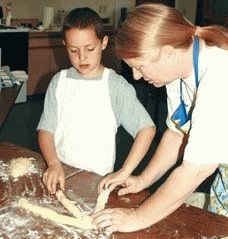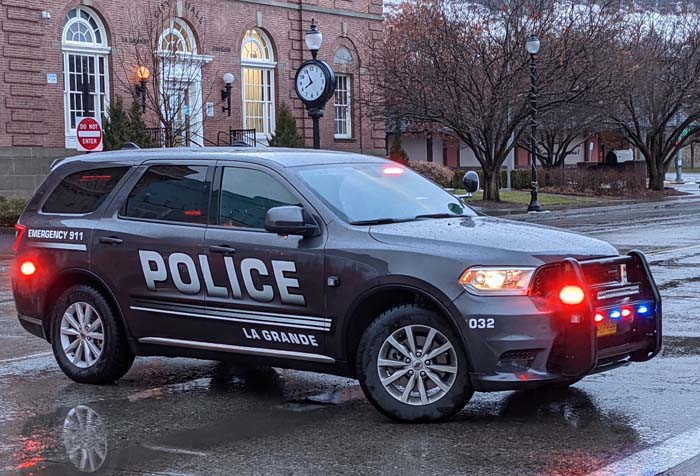4-H LEADER OF THE YEAR LIVES WHAT SHE BELIEVES
Published 12:00 am Monday, October 23, 2006

- Robin Gerber demonstrates her 4-H leader of the year technique as she shows Zach Harrison some of the finer points of bread making during a recent 4-H class. (Observer photos/CHRIS BAXTER).
– Mardi Ford
Trending
– The Observer
It all started with goats. The year was 1993 and Robin Gerber’s son Matt and his friend Justin wanted to raise goats for a 4-H project. But at the time, there wasn’t a 4-H club in La Grande for goats.
Not a problem.
Trending
Robin agreed to help them start one, and the Grinning Goats 4-H Club was born. Did Robin know anything about raising goats or leading a 4-H club? No. But again, not a problem.
"You can’t limit yourself because you don’t know how. There’s always a book out there to do research on how to do something," says Robin.
In the early days, she had to read up on such diverse topics as basic shelter construction to help a member build a sheep pen and CPR for resuscitating newborn piglets.
"Every animal you can save is crucial to a livestock project," Robin says.
By example, she has taught her members to never give up and that everything is possible, especially when approached with a good attitude.
Earlier this month, a very much surprised Robin was chosen from among the nominations to be honored as 4-H leader of the year.
"I am so humbled by the honor. There are so many good 4-H leaders," she says.
County 4-H Extension Agent Carole Smith says Robin’s style is pretty low-key.
"She doesn’t make a big fuss about it, but she’s always there ready to jump in and lend a hand," Smith says.
Robin often uses humor to move the kids past difficult moments the sale or death of a livestock project, or any daunting or exhausting task that just doesn’t go well.
"Her nomination says she always has a smile or a joke. That’s Robin," Smith adds.
"Well, sometimes you just have to laugh or else you’ll cry," Robin explains. "What else can you do? You have to help them move through a tough time and see beyond it to the next step. Just like anything else in life, (learning and growing in 4-H) is a process."
Because 4-H is more than meeting once or twice a month to have fun. It also exemplifies the best a rural life offers while imparting what Robin calls life skills self-sufficiency, responsibility, compassion and confidence.
All four of her kids have learned lessons in the 4-H program that have continued to help them later in life. One example, she says, is her son Matt, who as a member of her sewing club constructed a perfectly tailored jacket complete with elbow patches.
"He wore that jacket a lot," Robin says.
Lou, Robin’s husband, jumps in to finish the story of how their son, now a medical student with his own business called TeamWorks International, impressed a group of surgeons during a recent humanitarian mission to Nicaragua.
"Matt was closing for one of the docs after a surgery when he asked him where he’d learned that nice, strong stitch. They’d never seen anything quite like it. He told ’em he’d learned it from his mom in 4-H," Lou says, laughing.
"Hey, sewing is sewing," Robin adds, grinning.
Whether teaching a kid to sew up a simple skirt or a wounded animal, this woman tackles any project with a can-do attitude that runs bone deep.
"She never does anything halfway," adds Lou. Unabashedly proud of his wife, he reaches across the table and picks up her left hand.
"See this?" Lou asks, indicating a missing fingernail. Seemingly embarrassed more at the fuss than at an absent fingernail, Robin pulls her hand out of his and tries to shush him.
Undeterred, Lou recounts how she sustained the wound remodeling the family’s kitchen. The injury was so severe, in fact, she wound up needing surgery. Which she had to go through alone.
"She was going into surgery while I was landing in Kuwait," recalls Lou, an Army National Guardsman.
The couple in the 1970s met as students at Eastern Oregon University.
Lou asked her to help him find a book because he thought she was cute. Robin told him to look it up himself because she thought he was lazy.
The Gerbers will celebrate their 26th wedding anniversary in February. Besides Matt, they have three girls Brigette, Elisha and Ruthie.
But the couple’s positive influence has always reached beyond their own four. Their home and hearts are open to all sorts of what they call "spare kids."
For 17 years, Robin has also been active in their church’s Caravan program.
"I believe I was given a gift to work with kids. And I view that work as an expression of my faith. Although I don’t preach Christianity, I share my values. You just live what you believe," she says.
After the Grinning Goats disbanded in 1995, Robin started a home economics club. Four years ago, she took on a new livestock club mostly hogs and sheep and now leads both the Happy Homemakers and the Union County Livestock clubs.
Even with the injured hand sling taped in against her chest, she never missed a beat with the 4-H program. She led both clubs with one good hand. "The words ‘I can’t’ are not in my vocabulary," she adds.
In some people that declaration might come across as a little cocky, but not with Robin.
Tough, upbeat, energetic, self-sufficient and independent, she is also quite soft, humble and shuns the spotlight. Try to get her to focus on what she’s done, and she continually steers the conversation back to her kids and their accomplishments.
One of her favorite success stories is of a girl who wanted to learn to sew. Neither of her parents knew how, but they supported her efforts. As the girl learned, one day her project had reached the point where she needed more than club time to finish it. Robin encouraged her to do some of it at home.
"To see the light come on in this girl when she realized I thought she could do it without me there to help her anymore was awesome. And then when she did it … " Robin’s smile finishes the thought.
When she started that first livestock club, Robin figured her own 4-H involvement would endure until her kids got out of high school. But with the youngest now almost out of school, she realizes that for her quitting may not be an option just yet.
"What am I supposed to tell the younger ones just starting? That I won’t be there to see them through?" she asks.
The county program always needs more leaders, she says but beyond that parents, educators and business people who might think they are either too busy to commit to leading a club should consider another option.
"Workshops on a specific topic. Half a day or half an hour. We’re always looking for someone to come in and share something new," she says. "It doesn’t take a lot of money to open doors for kids. It just takes somebody willing to give themselves."









